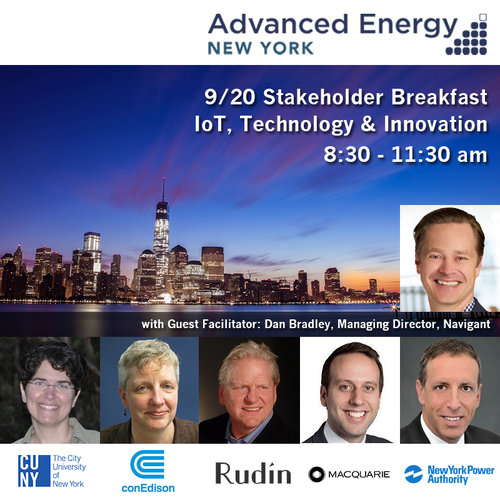- Vishant Kothari & Isabella Suarez, AEG Fellows
Improvements in technology have consistently moulded the cities we live in, starting from the steam engine to automobiles to high-rise construction. Unsurprisingly, the internet and other related modern technologies are bringing about a similar leap in how cities around the world evolve. The opportunity and role it has to play in achieving the city’s Reforming the Energy Vision (REV) plan, as well as OneNYC’s citywide emission reduction goal of 80% by 2050, cannot be ignored.
New York City is taking a pioneering role in digitizing its utility system, electrifying buildings, using smart property technologies, and exploring a wider scope of battery technology.
NYPA’s Visions 2020
The New York Power Authority (NYPA), the largest state-owned public power system, has ambitions to become the first end-to-end digital utility through their Vision 2020 plan. At its core, it outlined six strategic initiatives to transform the Authority into a next generation utility capable of leading the rapidly evolving New York State energy system. With the Integrated Smart Operations Centre (iSOC) and the recently announced Phase 1 of the sensor deployment program - that will incorporate new technologies to perform online monitoring of power plants, substations and power lines to increase efficiency and productivity and improve resiliency of NY’s statewide power network; the infrastructure is being developed to achieve this vision.
Building Electrification & Retrofitting
As 80% of GHG emissions in NYC come from buildings, addressing energy use in buildings would result in substantial reductions. The most plausible course for emissions reductions would be building electrification, but this would likely increase the demand on the grid multifold. New York City seeks to impose limits on the use of fossil fuel and energy for buildings exceeding 25,000 gross sq. ft. However, the benefits of retrofitting buildings for electrification, in comparison to the overall costs consumers may accrue, are unclear. Any effort to electrify and retrofit the city’s many buildings will require a significant amount of technological deployment.
Energy Savings from Technology
In 2017, the Real Estate Board of New York (REBNY) launched the REBNYTech Committee, whose mission is to ensure New York City remains a leader in the global PropTech movement. This has resulted in an increased uptake in app monitoring systems for residential buildings, focusing on a customer-centric user experience that includes not only building energy, HVAC systems usage and security, but also local transit routes, integrated food delivery apps, etc. Such technology allows for real-time monitoring and adjustment, which leads to substantial energy savings.
Improved battery storage is also proving to be a game-changing technology, allowing load reductions from the grid and quicker solar power adoption; thereby, reducing large quantities of emissions in the city. ConEdison recently released implementation plans for two pilot projects - Innovative Storage Business Model and Aggregated Behind the Meter Energy Storage. While these are relatively small pilots, it provides use cases for potentially high-scale execution, which startups, end-use customers and the climate would benefit from.
While there is no singular question to be answered when it comes to technology and IoTs, New York City is proactive in ensuring that it is well prepared for the increased projections in energy demand, adjusting its systems and creating initiatives that will allow it to adopt this new wave of technologies. Advanced Energy Group’s Q3 stakeholder event on IoT, Technology and Innovation aims to host insightful discussions on such initiatives, its impact on the city, and the short term actions that need to be taken to realise this potential. Discussion leaders for the event will include:
Tria Case, Director of Energy & Sustainability, City University of New York
Margarett Jolly, Director Demonstration Projects - Customer Energy Solutions, Con Edison
John Gilbert, Chief Operating Officer, Rudin Management Co., Inc.
Stephan Feilhauer, Senior Vice President, Macquarie Capital
Bob Lurie, EVP, CFO and Chief Strategy Officer, NYPA
Along with leaders from CUNY, NYPA, ConEd, Rudin Management Co. and Macquarie Capital providing perspectives and ideas for the ensuing discussion, the Stakeholder Breakfast on September 20th, 2018 could be pivotal in understanding the opportunities and role of technology in achieving OneNYC’s 2050 goal.
Advanced Energy Group is a stakeholder member-supported organization committed to developing and delivering advanced energy policies and solutions in key cities. Stakeholder sessions are by invitation only. For details of our programming please visit:
AEG Event Calendar | Podcasts | Videos | LinkedIn | Twitter

